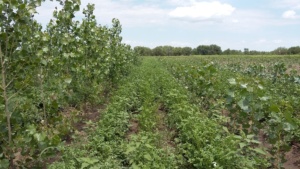 According to the classification of the Food and Agriculture Organisation (FAO) of the United Nations, Central Asian states do not have abundant forest resources. Unfavorable economic conditions and population growth are the main causes of intensive logging of existing forests. The lack of a coherent mechanism of modern management practices also contributes to the degradation of forest areas. Together, these factors worsen the living conditions of people and animals, and the stability of regional ecosystems. Therefore, particularly in today’s context of climate change, comprehensive conservation and sustainable use of forest resources are crucial.
According to the classification of the Food and Agriculture Organisation (FAO) of the United Nations, Central Asian states do not have abundant forest resources. Unfavorable economic conditions and population growth are the main causes of intensive logging of existing forests. The lack of a coherent mechanism of modern management practices also contributes to the degradation of forest areas. Together, these factors worsen the living conditions of people and animals, and the stability of regional ecosystems. Therefore, particularly in today’s context of climate change, comprehensive conservation and sustainable use of forest resources are crucial.
We aim to support our governmental and local partners in all five Central Asian countries to modify laws and regulations, and to reform relevant public agencies and other organizations working in the forestry sector. The principles of sustainable development, which promote both ecological stability and the generation of long-term socially equitable economic benefit, guide our work.
Our measures
Our experts support the testing of new management approaches at the local level, and dissemination of results to the national level. Best experience are available to administrative bodies and governmental agencies through regional knowledge exchange. New methods for sustainable forest use tailored to local needs are being developed together with the population and local authorities. At the national level, we assist our partner line ministries in adapting new methods and supporting reforms that facilitate their implementation.
Through advisory support to the Forestry and Wildlife Committee of the Ministry of Agriculture, we contribute to efforts aimed at developing mechanisms for state support for private afforestation. These mechanisms are designed to stimulate investments in afforestation for the creation of a private forest fund in the country.
Six pilot plots for plantation of fast-growing tree species have been established in Akmola, Almaty and Zhambyl region. Technical data collected from these plots will serve as a basis for the development of mechanisms for state support for private afforestation.
At the regional level, we strive to promote the exchange of knowledge and experience between countries. Through field visits, representatives of the forestry sector of Kazakhstan, Kyrgyzstan, Tajikistan and Uzbekistan establish mutual cooperation and get acquainted with the testing and implementation of new approaches in local contexts.